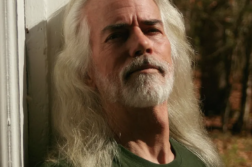ARTHUR DONG makes documentary films that examine anti-gay attitudes in American culture. His open-ended approach encourages viewers to situate themselves in relation to the issues he investigates, which include homophobia and racism, among others. Coming Out Under Fire, based on Allan Bérubé’s book by that title and completed in 1994, explores the development (and utter stupidity) of the U.S. military’s “Don’t ask, don’t tell” policy by focusing on a group of gay and lesbian veterans of World War II. Licensed to Kill, televised by PBS in 1998, is Dong’s riveting look at anti-gay violence. (Dong survived a gay-bashing attack in 1977 by throwing himself against the front of a passing Volkswagen bus.) For this film, he went to prisons around the country to ask killers of gay men, “Why did you do it?” Their answers implicate religious and political leaders who make anti-gay pronouncements. Family Fundamentals, released in 2002, focuses on families in which fundamentalist Christian parents reject a gay son or daughter. These three films are available in a boxed set under the umbrella title, Stories from the War on Homosexuality.
In keeping with his grass-roots philosophy, Dong distributes his own work through DeepFocus Productions, his Los Angeles-based company. Dong was born the son of Chinese immigrants in 1953 in San Francisco, where he came out in 1969 and made his first film in a high school art class in 1970. He went on to study filmmaking at S an Francisco State University and at the American Film Institute. Sewing Woman, Dong’s 1982 film focusing on his mother’s experience as an immigrant in America, was nominated for an Academy Award. Lotus (1987) is a dramatic short condemning the binding of women’s feet in China. Forbidden City, U.S.A. (1989) spotlights a San Francisco nightclub that featured Asian-American performers and became an international tourist attraction during the 1930’s and 40’s. Another documentary directed by Dong, Out Rage ’69 (1995), was the first of four episodes in the PBS series, The Question of Equality, a history of the gay rights movement. It asked difficult questions, focusing on racism, sexism, and class prejudice within the gay rights movement, as well as homophobia outside of it.
an Francisco State University and at the American Film Institute. Sewing Woman, Dong’s 1982 film focusing on his mother’s experience as an immigrant in America, was nominated for an Academy Award. Lotus (1987) is a dramatic short condemning the binding of women’s feet in China. Forbidden City, U.S.A. (1989) spotlights a San Francisco nightclub that featured Asian-American performers and became an international tourist attraction during the 1930’s and 40’s. Another documentary directed by Dong, Out Rage ’69 (1995), was the first of four episodes in the PBS series, The Question of Equality, a history of the gay rights movement. It asked difficult questions, focusing on racism, sexism, and class prejudice within the gay rights movement, as well as homophobia outside of it.
Dong’s work has won numerous honors and awards, including a Peabody Award, three Sundance Film Festival awards, five Emmy nominations, and two GLAAD Media Awards. He is currently developing a documentary looking at Asians and their portrayal in Hollywood feature films.






